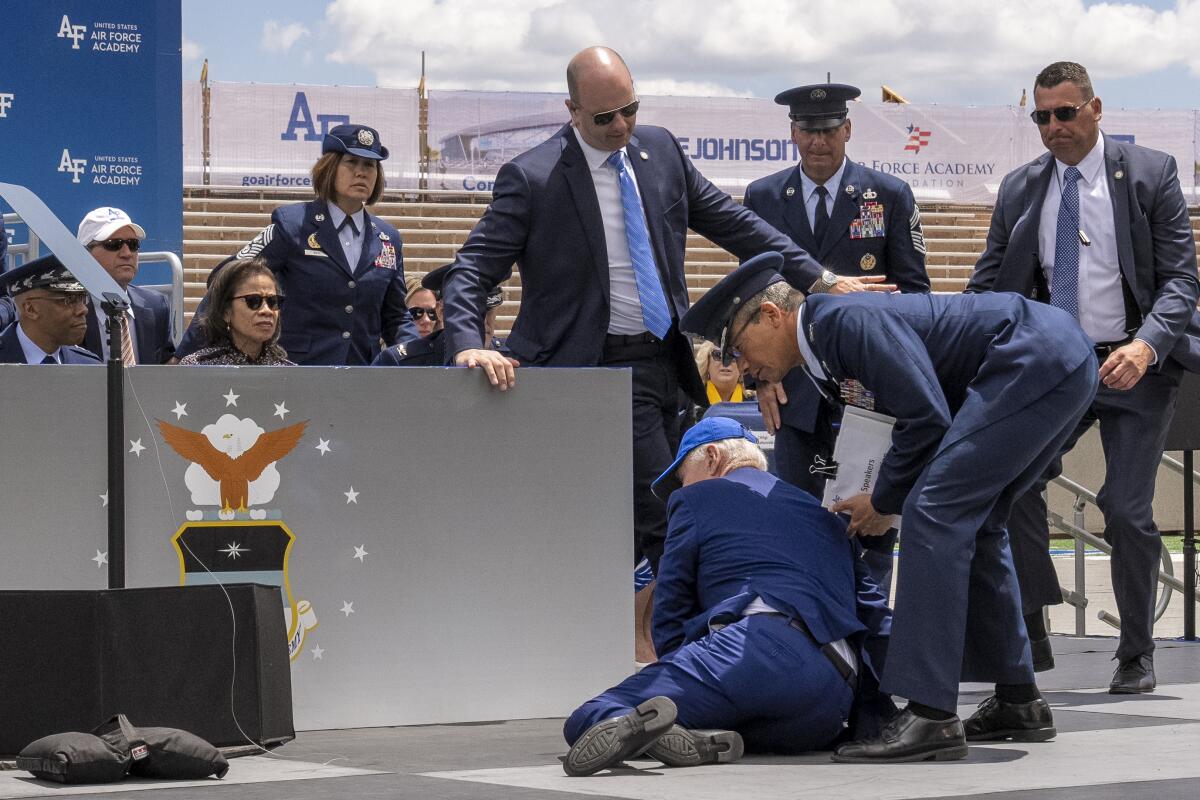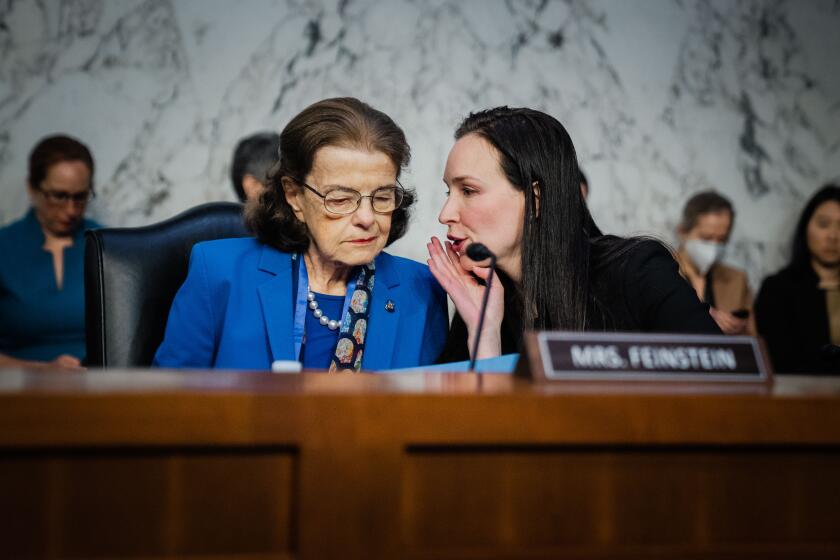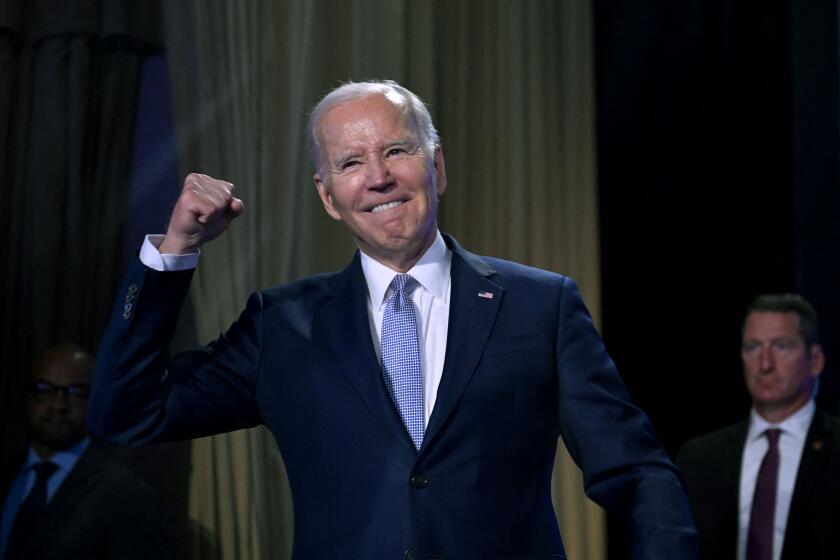Opinion: Biden, Feinstein, Trump — how do we know when our leaders are too old?

- Share via
In politics, as in life, it’s all too easy to write off old people, especially when they are frail or disabled. President Biden’s fall on stage during the Air Force Academy graduation ceremony on Thursday immediately raised questions of fitness. Even I, a geriatrician and anti-ageism advocate, looked at Dianne Feinstein’s recent return to the Senate after a prolonged absence due to shingles without fully seeing her. The voter in me felt appalled by her condition; the doctor in me wanted to get her home and comfortable.
These are normal, natural and necessary reactions. They also risk forfeiting opportunities to improve work in later life for the good of all Americans.
On the national political stage, age has increasing relevance. The 2024 presidential election currently has 76- and 80-year-old front-runners. In Congress, people are questioning the tenure of Senate majority minority leader Mitch McConnell (R-Ky.) given his recent long absence after a geriatric fall. And we marvel at Rep. Nancy Pelosi (D-San Francisco), an octogenarian so fit that reporters decades younger have trouble keeping up with her as she races along in heels. That at least three of these leaders seem to have made efforts to appear younger speaks to our cultural equation of old age with incompetence and unattractiveness, biases that are ageist, ableist and disproved daily by millions of older adults.
Of course, age matters. With each decade, our chances of illness, new disability and death increase. A 60-year-old president could die, but the odds are higher for an 80-year-old. Similarly, a 60-year-old president could fall, but they are less likely to sustain a life-altering injury from one than an 80-year-old.
The call for Dianne Feinstein to retire sounds like the same old sexism her generation of women had to tune out to succeed. Here’s why it isn’t.
On the other hand, if we set work limits based on age alone, we risk premature loss of talent and opportunities — for individuals and society. We also exacerbate what has become a defining dilemma of our time: simultaneously demanding older workers retire and lamenting the economic burden imposed on society by unemployed elders.
One solution is to develop evidence-based guidelines that can be used to create employment standards across industries. That approach would use data and expertise from leaders in economics, geriatric medicine, gerontology and elsewhere to optimize work in older ages despite the considerable diversity in health and function across the decades of elderhood.
There are two key issues that need to be addressed to make this happen. The first is deciding when age matters. Despite more than a century of increased longevity, we don’t know how to invoke age most equitably and effectively — at either end of the spectrum. Human beings are maturing later and later and are living longer and longer. This raises questions such as, at what age is a person too young or old to buy a firearm, drink alcohol, go to war, drive a car or hold political office. How we handle these issues affects us all.
The second issue we must determine before creating guidelines on age and employability is deciding who gets to participate in that process. I have spent decades thinking about old age, yet over Memorial Day weekend my 89-year-old mother offered an insight that I missed about Feinstein, that the senator was most likely sacrificing her dwindling well-being to fulfill her duties to office, party and country. That gave me pause: If Feinstein were 52 with terminal cancer, instead of old and frail, might I have seen her actions as heroic instead of incomprehensible?
Joe Biden has an incumbent’s advantage, deep pockets and a sturdy legislative record. But, but... his age? So what?
When developing guidelines — or deciding whom to vote for — we need to consider more than a person’s age. For example, how do we compare a political candidate who is prone to lying with one who might benefit from walking with a cane? Or a politician who has fallen several times without injury to one who fell once and spent months recovering?
The issue of falls illustrates another complicating factor: our societal tendency toward “adultism.” We know older people fall, yet we do little to create a world that limits such falls and resulting injuries. A sandbag on a stage may not matter to adults but it might trip up an elder such as Biden, yet that has nothing to do with his ability to give a commencement speech. I have lost count of the numbers of my older patients who have fallen over the cement wheel stops that demarcate the front end of parking spaces. If children or adults were harmed by those that often, we likely would have taken action rather than blaming their age.
We will all stop working eventually, and, barring sudden death, we will all develop illness and disability before we die. Since it’s virtually impossible to predict when that will happen and even whether a particular illness or injury warrants retirement, guidelines for assessing competence are needed. Right now, all we know for sure is that the absence of such recommendations causes problems. Articles detail the fallout of arbitrary retirement ages on highly skilled workers and the adverse consequences when people continue working despite evident limitations — a circumstance that may explain Feinstein’s current predicament.
We are the generations that get to reap the benefits of the human race’s new longevity. With that privilege comes a responsibility to evolve our ideas about aging and adapt societal norms, structures and policies to optimize work and well-being across the lifespan. In the meantime, it’s worth remembering one of our favorite sayings in the geriatrics community: When you’ve seen one 80-year-old, you’ve seen one 80-year-old.
Louise Aronson is a geriatrician and professor of medicine at UC San Francisco. She is the author of “Elderhood: Redefining Aging, Transforming Medicine, Reimagining Life.”
More to Read
A cure for the common opinion
Get thought-provoking perspectives with our weekly newsletter.
You may occasionally receive promotional content from the Los Angeles Times.












